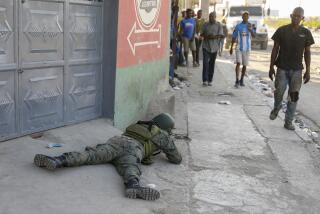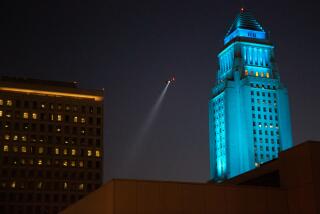Hunting for helicopters
- Share via
“Is there a world helicopter shortage nobody told us about?” begins a Dec. 13 editorial excoriating United Nations member states for refusing to lease helicopters for a peacekeeping mission in Darfur.
In fact, the answer to that question is yes.
On Nov. 27, Reuters reported that shortages of helicopters are hobbling U.N. missions all over the world. “A shortage of top-end machines needed for tropical conditions plus a reluctance of countries to bear the costs of deploying them,” the article noted, “are being exacerbated by a procurement logjam that means a major renewal of Western fleets is years off.” That procurement gap, Reuters stated, will likely not be closed for another two years, when a new generation of helicopters suitable for the hot and dusty conditions of a place like Darfur is made available.
Still, a lack of global helicopter capacity should not excuse U.N. member states particularly those which have complained loudest about Darfur from their duty. How and where countries decide to deploy the relatively few helicopters available is ultimately a matter of setting priorities. And as the editorial rightly protests, Darfur is still low on the totem pole.
The strategic importance of helicopters in Darfur can hardly be exaggerated. Darfur is a vast area, and its few roads are often subject to seasonal flooding. Helicopters are critical for transporting troops and equipment across an area the size of France.
Transportation is not the only purpose for which the helicopters will be used. The extent to which the Darfur mission will be able to protect civilians will depend on the availability of so-called force-multipliers. Assault helicopters can be decisive in deterring attacks on civilians, particularly when the attackers are using suped-up Toyotas and horses. It is widely acknowledged that a key turning point for U.N. peacekeeping in the Democratic Republic of Congo was the deployment of Indian air force attack helicopters, which were then used to target militias. Such “peace enforcement,” the euphemistic term for aggressively going after groups determined to spoil a peace, will be critical to the success of the Darfur mission.
U.N. officials have tried to stress the importance of helicopters, but so far their pleas have fallen on deaf ears. Earlier this month, in a message to a meeting of Nobel Peace laureates in Rome, the normally soft-spoken Secretary-General Ban Ki-moon came close to calling out the stingy member states by name. “In the past weeks and months, I have contacted, personally, every possible contributor of helicopters in the Americas, in Europe, in Asia,” he said. “And yet, not one helicopter has been made available.”
Speaking to reporters in mid-November, U.N. peacekeeping chief Jean-Marie Guehenno bluntly warned that the mission would fail should 24 helicopters including six attack helicopters not be made available. In a not-so-subtle jab at the missing political will of member states, Guehenno said, “I think it tells a sad story on the commitment for Darfur.”
He’s right. What’s really sad is that this sort of dynamic has been repeated over and over since the genocide erupted in 2004. The crunch for helicopters is simply the latest manifestation of member states’ real disinterest in mustering the political will to match rhetoric with action on Darfur.
Mark Leon Goldberg is a writer in residence with the United Nations Foundation and a senior correspondent with the American Prospect. He writes the blog U.N. Dispatch. The opinions he expresses are his own.
More to Read
A cure for the common opinion
Get thought-provoking perspectives with our weekly newsletter.
You may occasionally receive promotional content from the Los Angeles Times.









